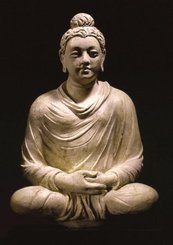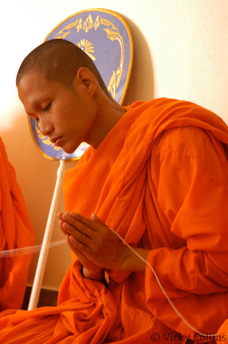SHARED PRINCIPLES
dependent origination
The Buddhist idea of dependent origination means different things to different Buddhist sects and can cause great misunderstandings. From a liology viewpoint, this profound idea is best defined by Buddhist scholar and systems thinker Joanna Macy, who describes it as "the radical interdependence of all phenomena... everything arises through mutual conditioning in reciprocal interaction." This is the sense of dependent origination that liology shares with Buddhist thought.
centrality of dukkha in human experience

The Buddhist path begins with the recognition that all human beings experience dukkha, which is usually translated into English as "suffering." However, most people thankfully don't view their lives as a continual experience of suffering and this really doesn't capture what dukkha actually means. Liology conceives of dukkha as the sense of separation from our lived experience that arises from the fact that we humans have a unique type of conceptual consciousness that creates abstract ideas, a sense of past and future, and a fixed sense of self. Attaining a fully integrated sense of our human existence can alleviate or even at times eliminate that dukkha.
value of meditation and mindfulness
Most schools of Buddhism emphasize the importance of meditation as a regular practice and the value of living our daily lives in a mindful way. Liology embraces both meditation and mindfulness as essential elements in achieving an integration of mind and body and experiencing love and harmony in our lives.
value of compassion and lovingkindness
Some Buddhist traditions put a premium on the experience of lovingkindness or metta as a central part of a spiritual path. Liology shares this sense of the importance of compassion and lovingkindness as what naturally occurs out of the recognition of our intrinsic connectedness with all other sentient beings.
REINTERPRETATIONS
dukkha
Liology understands dukkha in terms of the split consciousness that is an essential characteristic of the human mind. Our prefrontal cortex (pfc), which is far more developed in humans than other animals, permits us to think symbolically and create all the amazing constructions of our culture and technology that allow us to thrive. It also creates a split between our conceptual consciousness (mediated by the pfc) and our animate consciousness - that part of our lived experience that we share with other mammals.
This leads us to split our sense of who we are between an "I" - the product of our conceptual consciousness - and a "self" that arises from our animate consciousness. We naturally demonstrate this split self in our language, such as when we say "I am too hard on my self" or "I am pushing my self." In this model, dukkha can be understood as the distance between the "I" and the "self." We have the ability, as conscious humans, to reduce this distance to the place where we can say "I love my self" or "I am at one with my self." This is an important part of liology's invitation.
This leads us to split our sense of who we are between an "I" - the product of our conceptual consciousness - and a "self" that arises from our animate consciousness. We naturally demonstrate this split self in our language, such as when we say "I am too hard on my self" or "I am pushing my self." In this model, dukkha can be understood as the distance between the "I" and the "self." We have the ability, as conscious humans, to reduce this distance to the place where we can say "I love my self" or "I am at one with my self." This is an important part of liology's invitation.
anatman: no-self

A key Buddhist teaching is that the "self" is an illusion that we create in our minds and that realizing the illusory nature of the self - anatman or "no self" - is an important step towards enlightenment. This Buddhist "self" is not the same as the "self" just described in the paragraph above. Rather, it's a constructed frame of who we are, someone with a fixed boundary, a narrative with a past and a future.
Liology agrees with the Buddhist teaching that this fixed sense of a self is illusory, and sees it as a construction of the conceptualizing behavior of the pfc. However, liology doesn't claim there is no such thing as the self. Rather, it sees the self as an ever-flowing, dynamic creation of human consciousness, with ever-changing boundaries and definitions, just like a river is always flowing and can never be fixed in one place, but it still can be said to exist as a river. In liology, recognizing the flowing, dynamic nature of the self is understood as an essential step towards achieving harmonization with all the different elements that make us an embodied human being.
Liology agrees with the Buddhist teaching that this fixed sense of a self is illusory, and sees it as a construction of the conceptualizing behavior of the pfc. However, liology doesn't claim there is no such thing as the self. Rather, it sees the self as an ever-flowing, dynamic creation of human consciousness, with ever-changing boundaries and definitions, just like a river is always flowing and can never be fixed in one place, but it still can be said to exist as a river. In liology, recognizing the flowing, dynamic nature of the self is understood as an essential step towards achieving harmonization with all the different elements that make us an embodied human being.
PRINCIPLES NOT SHARED WITH LIOLOGY
belief in reincarnation
Many - but not all - Buddhists believe in the principle of reincarnation: that there is some "essence" of who we are which has inhabited other bodies before us and will be reincarnated again in the future. Liology does not share this belief. From a liology perspective, the idea of reincarnation is incoherent and is understood to have arisen ultimately from the dualist cosmology of the early Vedic culture of the Indian sub-continent, where Buddhism originated.
belief in karma
Following on from the idea of reincarnation, some Buddhists believe that there is some form of supernatural cosmic justice which judges our actions and causes our "essence" to be re-born in other incarnations that are better or worse, depending on the actions of our present incarnation. This belief in a judging supernatural power is not consistent with liology.
practices of renunciationThere are some traditions in Buddhism which follow renunciation practices, such as withdrawing from the world into monasteries, or avoiding sexual activity in the belief that this might aid in the path to enlightenment. There is no renunciation in liology. Rather, liology actively encourages the integration of all aspects of our humanity, including sexuality and worldly activity, into one harmonious whole.
enlightenment as purificationSome Buddhist approaches to enlightenment describe the path as a process of purification. Liology, by contrast, emphasizes the harmonious integration of all aspects of our lived experience - including those that are generally thought to be "bad" or "unworthy."
|


